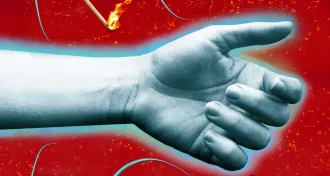Life
Sign up for our newsletter
We summarize the week's scientific breakthroughs every Thursday.
-
 Humans
HumansLead poisoning stymies condor recovery
California’s iconic comeback species may need human help as long as even a small percentage of the carcasses they eat contain lead shot.
By Susan Milius -

-
 Life
LifeSecond of two blocked flu papers released
Held back for months by a U.S. government biosafety board, the research pinpoints five mutations that render the potent H5N1 virus transmissible through air.
-
 Life
LifeNew frontiers for coyotes may bring more Lyme disease
Forget the deer. Maybe it's coyotes on the move that can explain the recent increase in Lyme disease.
By Susan Milius -
 Life
LifePeacocks ruffle feathers, make a rumble
New recordings reveal that male birds use infrasound, emitting low-pitch sounds detected by peers but inaudible to human ears.
By Susan Milius -
 Life
LifeChicks do worse in noisy nests
Baby bluebirds, and their parents, appear to have trouble communicating over the racket made by nearby humans.
By Susan Milius -
 Ecosystems
EcosystemsChanging seasons inspire science
Researchers are tapping into the wealth of observations being made by citizen scientists nationwide. One of the largest repositories of such data is maintained by the USA National Phenology Network.
By Sid Perkins -
 Plants
PlantsThe Man Who Planted Trees
Lost Groves, Champion Trees, and an Urgent Plan to Save the Planet by Jim Robbins
By Science News -
 Animals
AnimalsMr. Hornaday’s War
How a Peculiar Victorian Zookeeper Waged a Lonely Crusade for Wildlife That Changed the World by Stefan Bechtel.
By Janet Raloff -
 Neuroscience
NeuroscienceHurt Blocker
The next big pain drug may soothe sensory firestorms without side effects.
-
 Animals
AnimalsAnimals on the Move
Worldwide — on land, in the sea and in rivers, streams and lakes — wildlife is responding to rising temperatures.
-
 Life
LifeGrasshoppers’ terror outlives them
After an existence plagued by predatory spiders, the insects pass into oblivion, leaving a legacy of impoverished soil.
By Devin Powell